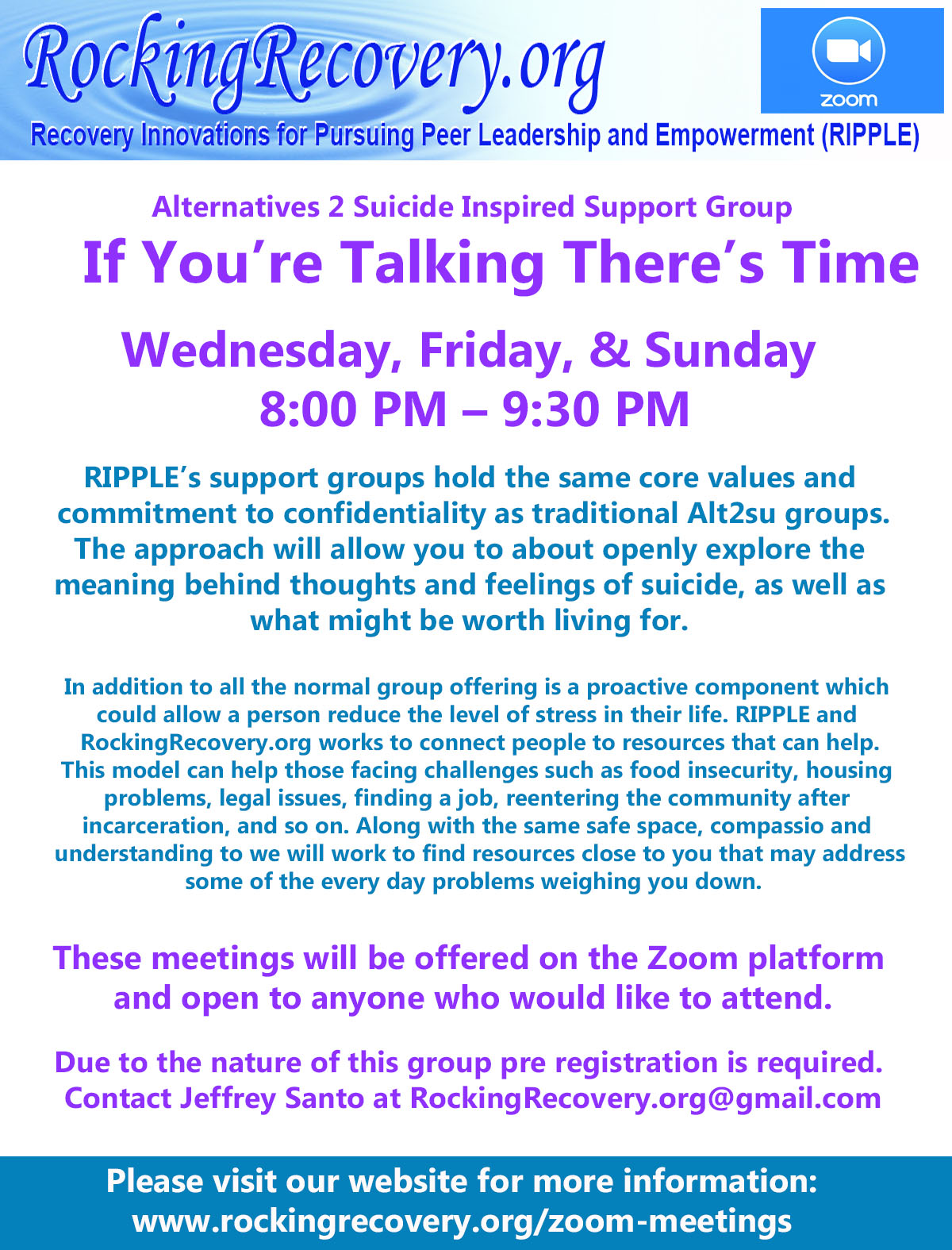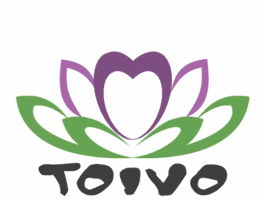A support group inspired by Alternatives to Suicide, created by the Wildflower Alliance of Western Massachusetts sometimes referred to as Alt2su which is a peer driven, nonjudgmental environment which provides a safe space to talk about your thoughts and feelings. Our model is, in some cases, a more proactive approach to helping those struggling. As you read further you’ll begin to understand why. The creation of If You’re Talking There’s Time came as a result of peers just like you sharing their stories with us.
What makes this group different? RIPPLE’s group holds the same core beliefs as the traditional Alternatives to Suicide model, the difference in our approach is we blend all of the good things about these groups and add our mission of finding people resources to improve their situations. To learn more about our model, If You’re Talking, There’s Time or Alternatives to Suicide Please use the dropdown folders below:
RIPPLE has hosted an Alternatives to Suicide support group since November 2022. As hosts, one of the things we realize is how week after week, the check-ins change, but the same source of stress remains. Sure, talking about it does help because others validate us, but validation does not fix a problem outside the group.
Our groups goal is to build on the traditional Alternatives to Suicide model which has proven itself by helping so many people in our communities Since the launch of RockingRecovery.org, we have been searching for the resources people need to get past surviving and move on to a point where they can begin to thrive. One of our core beliefs is that the stressors of life have a direct impact on a persons mental health and well being. Knowing that we want to help our groups members find some resources to potentially remove those stressors and improve their situations. Here is an example from our quarterly newsletter, Ripple Reflections:
“A single parent raising a child in middle school is faced with food insecurity, they have a job, but it does not provide the income necessary to cover many expenses beyond the rent and utilities. Unfortunately, as with most people, they made too much money to qualify for food stamps.
A concerned friend called emergency services after reading some posts on social media. Police and EMS arrived at this person’s apartment, and they were brought to the hospital for an evaluation. They stayed for four days and had a case worker assigned. Medication was offered but refused, then talk therapy was suggested. They managed to get on state insurance that covered the cost. The agency that the therapist worked through billed the insurance 242 dollars per 45-minute session, and they attended one session a week.
Here is a question we must ask as peers trying to support others, how is it the system solution to this person’s food crisis is paying $12,584 a year in therapy bills but says $300 a month or $3,600 a year to feed their family is out of the question? If this person got what they needed in the first place, the system would save almost $9,000 a year, which is the difference between the needed resource and the therapy bill. Now remember, most suicide prevention models try to keep them “safe in the moment” with the goal of getting them into the very same system.”
In addition to the support offered through the peers in the room we would also try to work this person connect them to food pantries and utility assistance programs available in their areas. We believe if a person is given the resources they need to get to a better place in life they will begin to heal. We can offer a doorway to those facing food insecurity, housing problems, legal issues, needing a job, reentering the community after incarceration, and so on. We acknowledge that this model will not help everyone in the same way. People grieving the loss of a loved one or fighting an illness would be good examples of our limitations. For them we will offer support, fellowship, and understanding as we have always done in the past.
RIPPLE will remain faithful Alternatives to Suicide teachings and continue to adhere to the standards they have put in place. We will also require group facilitators to have successfully complete a recognized peer certification training and abide to the code of ethics of Recovery Innovations for Pursuing Peer Leadership and Empowerment, and all other peer support codes of conduct established by training organizations, and agencies of the State of Connecticut.
If Your Talking There’s Time: A Better Alternative
Since 2008, the Western Mass RLC has hosted healing spaces for conversations
around suicide and despair that otherwise rarely happen. Alternatives to Suicide
is the approach that has grown out of that work, and can be applied to a variety
of situations that involve speaking about, sitting with, understanding and moving
through thoughts of wanting to die. This Charter defines the principles and
values of support groups using the Alternatives to Suicide approach.
Responsibility To—and not For or Over
As a community, we are responsible to be honest, transparent and present with one another,
but cannot be responsible for one another’s choices or actions. Both experience and research
have shown that when the system takes responsibility for or over an individual, through force
and/or coercion, the typical result is often more trauma, isolation and disconnection. Trauma,
isolation, disconnection have been linked to increases in suicide rates.
Consent and Choice
We honor that suicidal thoughts are valid responses to painful experiences in peoples’ lives.
That pain often comes a lack of choice related to resources, housing, relationships and
community, healthcare, income, work, exposure to violence and so on. In contrast, these
groups prioritize consent and self-determination, and recognize and respect the many ways
that people live with, sit with, cope with, or move through these experiences.
Responses to Injustice
In these groups, we validate and explore the hurt and pain we experience of systemic
oppression and injustice—for example, rape, interpersonal violence, and discrimination or
being devalued based on race, gender, ability, sexual orientation, immigration status, class,
employment status, generational traumas and other inherited struggles. Together, we make
space to explore the unique ways each of us makes meaning of and responds to these
injustices.
Healing in Communities
These groups emphasize being part of community by choice. For many people, moving
through suicidal moments includes acknowledging the pain that can come from feeling like
they don’t belong, or from being hurt or rejected by people with whom they have been
connected. In groups we make space for envisioning a world where one consistently has a
sense of belonging, and can find meaning and purpose.
This Charter is meant to act as a guide for creating groups that are consistent with these
values, and and an tool for advocating for these groups to occur even when they are in
conflict with other organizational or community policies or beliefs. What follows are the
practices and intentions essential to Alternatives to Suicide groups.
1. We invite conversations with the freedom to:
***a. Make meaning and share about one’s own experiences in one’s own words.
***b. Challenge and explore social roles and expectations impacted by gender, class, race,
***productivity, parenthood etc.
***c. Talk about anything, not just thoughts of suicide.
2. Groups meet in community spaces, rather than clinical or treatment group settings where
conflicting practices are or have been in place.
3. Facilitators openly identify with the experience of suicidal thoughts in groups and are willing
to be vulnerable and share about this and other relevant life experiences during groups
4. No pressure of any kind is placed on facilitators to report back (to funders, supervisors, or
other authorities) about details of who attend s or what gets shared in groups.
5. Value of privacy is stated, and everyone is asked to maintain that “what’s said here, stays
here” or to “leave the names, take the lessons.”
6. Responsibility for what happens during the group and how the values are held among all
people attending, and is not solely the responsibility of the facilitators.
7. Everyone present is asked to speak from their personal experience, avoid harmful
generalizations, and honor that each individual is the expert on themselves.
8. Where language is concerned:
***a. Facilitators use open, non-clinical language that makes space for a variety of
***perspectives;
***b. There is no assumption that suicidal thoughts are linked to ‘mental illness’ and
***everyone is supported to use words that make the most sense to them when speaking
***about their own experiences.
9. The group recognizes that suicidal thoughts are often rooted in experiences of systemic
oppression; and therefore:
***a. People’s experiences of systemic oppression are validated; and
***b. We strive to consistently interrupt words and actions rooted in systemic oppression,
***and explore where these ideas come from whenever possible.
10. We value relationships, embracing and working through imperfections to learn and grow,
rather than trying to fix or change each other.
11. Groups are only for people attending for their own support. Observers such as media,
students, providers, and anyone else wanting to come for any reason other than to explore
their own experiences are not able to attend.
12. Decisions are made by group consensus as much as possible and transparency is prioritized
when decisions are made outside of that format.
13. Attendance is completely voluntary and self-determined, being open to people:
***1. Without regard to where they live
***2. Whether or not they use particular services
***3. Without intake, discharge, referral or other ‘gatekeeping’ requirements
***4. Whether or not someone chooses to speak when there (silence and acting as a witness
***to other people’s pain are named as valuable)
14. Value is placed on meeting and accepting people as they are—validating the stories people
share about themselves,
15. Emphasis is placed on a harm reduction approach which includes avoiding assumptions when
someone shares about self-injury, drug use, or any other coping practice.
16. Relationships are based in respect and curiosity instead of fear and judgment.
17. Groups prioritize an overall willingness to sit with people in deep distress and explore
thoughts and feelings without jumping to clinical or other interventions.
18. All participants agree not to call to involuntary interventions like police, crisis services,
people’s family members, or other outside entities about something that’s happened in the
group unless there is an act or direct threat of violence to someone in the group.
(c) Western Mass RLC, August 2020: info@westernmassrlc.org
In keeping with RIPPLE’s tradition of offering night time support groups we have chosen Wednesday, Friday, and Sunday nights at starting at 8:00PM for our meetings. We strive to make sure our meeting space is as safe for our participants as possible, this is true of both our in person and virtual groups. Given the topic of conversation and the emotions involved when discussing suicide we do require anyone wishing to attend to pre-register. Contact Jeffrey Santo at RockingRecovery.org@gmail.com for more information. The registration is one time only, once you have the zoom link you are welcome to attend whenever you feel the need to do so.

The Alternatives to Suicide support groups that are held throughout Connecticut, both in-person and virtually, are networked through Toivo, an initiative of Advocacy Unlimited.
For information on all the group offerings in Connecticut you can learn more at: toivocenter.org/alternatives-to-suicide/
Or reach out to Jennifer Tirado, Alternatives to Suicide Project Coordinator

![]() Our group flyer is available for download in a PDF format and is free for distribution. All participant information is strictly confidential. Anything discussed in the group stays in the group. If you are in crisis do not wait for a meeting, please reach out for imitate help. Information on both warmline and hotline options can be found HERE.
Our group flyer is available for download in a PDF format and is free for distribution. All participant information is strictly confidential. Anything discussed in the group stays in the group. If you are in crisis do not wait for a meeting, please reach out for imitate help. Information on both warmline and hotline options can be found HERE.


